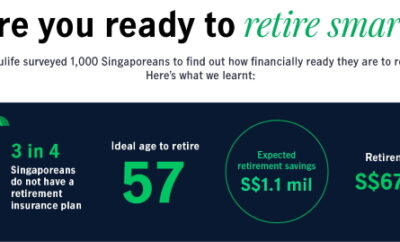
Insights + interviews
5 Personal Pre-retirement Finance Tips
Saving to retire should not be viewed as a means to an end, in fact the mindset to ensure continued financial security for retirement begins with the years leading to retirement.
Often, we view retirement as that door down the road that we do not want to think about. However, we are living longer than before, and our money needs to last longer so that we are able to provide ourselves with more experiences in life. The average Singaporean man can expect to live up to 80-years-old and for women 85. In 15 years time, we can expect one out of five people to be above 65 years old.
During this stage of life – pre-retirement, we can build and work on habits and actions that can provide us with the freedom to enjoy retirement. Importantly, this process should not be viewed as detracting from living positively in the moment but as a stepping stone in ensuring one’s freedom throughout the rest of his or her life.
Here’s a ‘starter kit’ for active agers looking to kick start their financial preparation for pre-retirement.
We can start by being more responsible for our own lives. Leading to pre-retirement, we made many decisions based on what our children, partner or career need. However, life has continued moving, and our nest might be empty soon; we have had a good swing at our career and there is the prospect of confronting the reality that we might be alone one day. The important person to plan around – starting now – is yourself. For many of us, the goal is not to retire in the traditional way, but to own the flexibility and freedom to live life on our own terms.
Set financial objectives – This can be in the form of taking up a forced savings plan or re-evaluating investment options and timelines. Some people find it helpful to prepare a will, to help set clear priorities about the goals achieved (or left to do) for legacy-planning purposes.
Importantly, this is also the time to consider designating a savings accounts that serves as a financial reservoir for your pre-retirement years. During good years in your career, consider saving more. This can also be a lifeline when times are not too good or when the economy hits a rut. Consider investing such funds from this account into ‘capital-guaranteed’ investment vehicles such as government bonds. Use the profits or dividends earned as an allowance for extra spending or to give yourself a treat on special occasions.
You might have heard of diversification – where you allocate a financial sum between stocks (high risk – possibly big pay-off) and bonds (little to no risk, but lesser pay-out). A common recommendation is to keep the percentage of funds you have in bonds close to your calendar age. If you are 55, aim to have 55 percent of portfolio in bonds.
Whatever you save or have left, that will be your ‘nest egg’ when you retire.
Use only what you need to do what you want – Keep a record of your expenses to build an understanding of what you are spending on as well as any recurring expenditure. Our lifestyles do not change the day we retire and pre-retirement is the time we want to be able to enjoy ourselves with friends and family.
Approach expenditure and buying luxuries or large ticket items, such as a holiday abroad or a new car as mini-goals. Find means to save money for these items by reducing another expense or finding another source of financing instead of dipping into savings (opportunity cost).
Continue to work as a way to keep drawing income – This is fast becoming a popular option for many people to consider in the pre-retirement years.
Pre-retirees can enjoy the excitement of working on an interest or passion as opposed to working solely for money. An advantage of working for interest is the opportunity to pick industries and jobs that might have been a dream or focused on a passion. This can also serve as a way of paying it forward by giving back to a role in terms of expertise, mentorship or resource.
Settle your insurance needs sooner rather than later – Start meeting with financial advisors who can help you plan for medical, hospital and health-related matters and associated costs. This is generally a smart thing to do when you are younger and relatively healthier. The cost of premiums are not as high. Although there is no immediate use of the policies, it can save you a bundle when trouble hits and you might be forced to dip into your savings account.
Some insurance companies also offer plans that provide you with a fixed payout when you retire. This can be one form of diversifying your retirement budget.
Keep track of the things you want to do now, not the things you thought you might have liked – Lifestyle goals and bucket lists change all the time as you gather new information in the pre-retirement years. Perhaps that ’round-the-world’ trip of a lifetime no longer appeals because you want to adopt a pet instead. Or you might feel a pull to return to school and get that degree you keep telling yourself about. Keep track of these and realign your financial goals accordingly to match.
The fundamentals of managing your personal finance does not change or suddenly become easier as you age. Preparing a budget, controlling expenses, keeping track of large expenditures and realignment continues throughout life.









